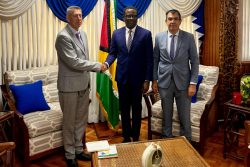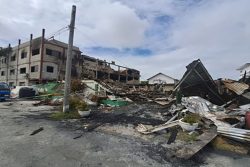The People’s Progressive Party acknowledged corruption in the party and government on the second day of the 30th Congress yesterday. During the presentation of the six workshops, Nigel Dharamlall rapporteur for the workshop on the party’s organization relayed that members thought that an integrity committee or the establishment of an integrity code would help to counter corruption allegations.
He said that corruption and the negative image it had on the party needed to be addressed and throughout the workshop discussions the two things were addressed multiple times. He noted that one of the other issues that was raised was directly tied to corruption allegations, and that was the loss of respect and lack of humility of party members.
Dharamlall stated that to counter corruption the management of resources had to be a priority. He noted that in villages throughout the PPP/C constituency more had to be done by management committees to oversee how resources are allocated and spent.
Dharamlall continued that the absence of party leaders in the communities did little to counter a growing sense of apathy. He noted that the workshop focused on seeing a greater presence not just of party members but ministers of government. He said that there was consensus that more planned visits were needed to assist in the “dysfunctional nature of our party structure.”
Moving on, Dharamlall took up what he described as the various irregularities during the 2011 election and Gecom’s inconsistencies. During the discussion on parliament and elections the rapporteur commented that the three party members who held posts at Gecom had to be more vigorous. The rapporteur did not explain further.
President Donald Ramotar had singled out Gecom in his address to the plenary and stated that a proper investigation of the commission had to be done while admitting that his party did display overconfidence heading into the 2011 general election which proved to be detrimental.
For his part, rappoteur Shyam Nokta drew attention to the Amerindian People’s Association, Red Thread and the Guyana Women Miners Association, that he accused of working alongside the opposition and perpetrating lies.
During his presentation on the current political situation he observed that the AFC had managed to take up issues in the PPP/C’s constituency because of the lack of a party presence. He said that “the AFC in particular was very quick to get on the ground and speak with effective stakeholders,” while the party lagged behind. While there was a large number of groups being formed the work was not actually being done, and this had led to the dysfunction, he said.
He noted that “the next election is certain, irrespective of whether it is in three months or three years, and that the strategy of appeasing the opposition will not work.” APNU in particular, he went on, had a militant movement.
When Indra Chandarpal gave an account of how the workshop involving the Progressive Youth Organiza-tion had gone, she pointed out that for many youths job security was primary, and so the party had a responsibility to assure young people had work through the development of more skills training and vocational institutions.
Time limit
As the discussion moved to the plenary Chairwoman of the session Gail Teixeira quickly shut down critical questions from members and instituted a two-minute time limit on those who wished to ask questions or offer criticisms. She said that the session was broad-based and that a more critical discussion would be had when the workshop reports had been fully compiled.
The other workshops dealt with local government and the international situation.







